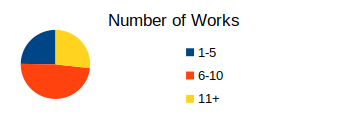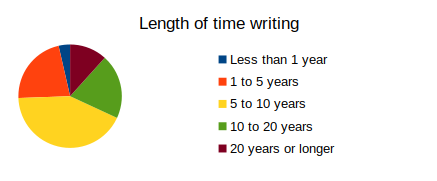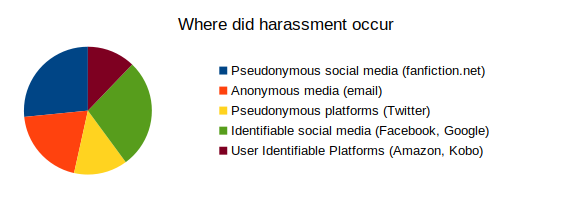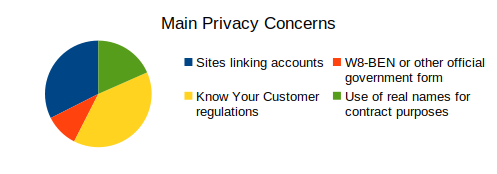From 1st February to 31st March, the Bookangel Club ran a survey on Author Safety Issues: harassment, stalking, privacy and more. Despite an extension, the initial results are in. With the help of Alli, the Crime Writersâ Association and the IWSG, 954 authors have had their say. The survey is still open for the next two weeks, but we are happy to release these initial results from the survey and will look at more details from the responses in the future.
The headlines are disturbing.
63% of respondents thought that less than one quarter of authors were harassed.
73% of them had actually been harassed.
28% of all respondents had suffered serious safety issues, including physical threats and criminal action due to writing.
The 28% of serious threats include arson attacks, kidnapping attempts, assault or theft at signings, and going after authorâs families in their day to day lives. Identity theft and credit card fraud were also reported.
Separating social media and real life, or simply not having social media is not sufficient protection. We had authors who did not use social media say that it was used to co-ordinate harassment against them. Others stated their identities were shared without their consent by their publisher, agent, or platform.
One of the major problems when trying to find solutions to these issues is the belief of many authors that âit wonât happen to meâ, leading to people who suffered through this being blamed for not taking precautions. From several comments it seems to be part of a âjust worldâ fallacy â the belief that bad things only happen to people that deserve it.
As the survey was anonymous we did not capture any demographics on the age or gender of the writer, instead focusing on how long they had been writing for, what they wrote and, if appropriate, what genre they wrote in.
How many works do they have: Unknown: 0.6%, 1-5 works: 24.6%, 6-10 works: 48.2%, 11+ works: 26.6%

How long have they been writing for? Unknown; 0.4%, Less than 1 year; 3.6%, 1 to 5 years: 21.9%, 5 to 10 years: 42.4%, 10 to 20 years: 20.1%, 20 years or longer: 11.6%

What they are writing? Just Original Fiction: 58.5%, Just Fan Fiction: 16.8%, Original and Fan Fiction: 7.8%, Original Fiction and Non-Fiction: 6.8%, Non-Fiction: 5.2%, Other: 4.9%
When it comes to the genres, many writers had written works in more than one, but we had over a hundred respondents in each of our categories of Crime or Mystery, Romance or Erotica, Suspense or Thrillers, Non Fiction, Speculative Fiction, and Humour or Comedy.
This gives the survey a wide spread of writers, both in terms of how long they have been writing for and the types of works they create.
Most online harassment happened on platforms that were not anonymous. Social media that required some form of identification to sign up to, e.g. Facebook or Amazon, (39.2% of cases), and those the required phone verification (39.4%) were well ahead of the truly anonymous platforms at 19%. However one platform was specifically mentioned in comments as a problem: Goodreads. Despite not being on the survey itself, 2% of authors specifically mentioned either behaviour on the platform and the platformâs response as an issue.

Regarding serious safety issues, reports came in of extortion or blackmail attempts. One specific scam that kept coming up was leaving multiple bad reviews and then sending the author a demand that they pay for them to be removed. There was also identity theft and fiscal crime: having obtained an authorâs details, the harasser went after them financially. Attempted kidnap, physical or verbal assault, and others were rarer, but still sufficient that they cannot be tracked back to one respondent.
In each case the common thread was that when reported to the platform or the authorities, the response from them was ineffective, ranging from platforms refusing to take action over problems ranging from threats to extortion, to the police stating they could not get involved because it was âjust onlineâ or that the person should have been ânicerâ to their stalker. That last affected both male and female respondents.
Overall this behaviour has a huge impact on authorâs writing careers: despite so many respondents thinking it was rare, many of whom were being harassed while thinking they were one of the few, 60% of authors took precautions. The fact 73% were harassed shows both that these precautions were needed and that they were ineffective.
The most common precautions were to separate writing and personal identity, and leave social media. However 26% of author had problems with sites linking accounts, and several reported harassment on platforms that they were not on, by people starting rumours etc. that then spread.
Regulatory issues also proved to be a major privacy concern: 31% of respondents had issues with Paypal, or did not use it due to reports of this, and it was repeatedly stated that harassers used Paypal invoices to trace authorsâ real identities behind business accounts. 8% said the W8-Ben had caused privacy problems. However without these, it is very difficult for a writer to get paid for their work.

Financially this has a huge effect: 15% of authors have turned down or not applied for grants due to this issue. 5% of authors have turned down publishing deals. Another 15% have stated that their major privacy concern is the use of real names for contracts: borne out by the stories from other respondents of publishers, agents, and publishing platforms, revealing authorsâ real names publicly despite the use of pseudonyms and business identities. There is a genuine sentiment that allowing contracts to be signed with pseudonyms, and not using the authorâs real name in-house would do a lot to reduce the issue.
If this is so common, why is there a perception it is not?
When we were sending the survey out, we found one reason: among the authorsâ groups we contacted many did not respond, but one did give us the reason: âthis is not the view of writing we want for our audienceâ. If that is true for other groups, then it means that this is simply not being talked about among groups of writers. When those writers become one of the 73%, they think it is an outlier and may simply not discuss it or think it is their fault.
There is also an element of victim blaming. Several writers who had not been harassed expressed the view that authors should âtoughen upâ or that âstop writing and kill yourselfâ is a funny comment. That was beautifully put down by an earlier respondent saying they thought it was funny until someone posted it through their letter box.
Overall, more respondents suffered serious safety issues than most authors thought were being harassed in total.
In conclusion, this survey shows there is a deep-seated problem with safety and privacy in writing that only gets worse as people try to move into publishing their work professionally. Increasing regulation and the trend to tie all data to one online identity is making it far easier to harass people than it was twenty years ago. Better protection for personal data was a common request, with a subset requesting the use of pen names for regulatory purposes to prevent the harassment happening in the first place. However the nearly universal sentiment was that when it does happen an effective response is needed from both platforms and the authorities.
Authors are being told to live with it.
We didnât hear from the ones that didnât.
The survey itself has been extended to the end of April as a final date. We would like to thank all the groups that took part and everyone who had their say. It is not a perfect survey â we are a bookclub, not a statistics group â but if it gets people talking about harassment, the figures show that is a discussion that needs to be had.




